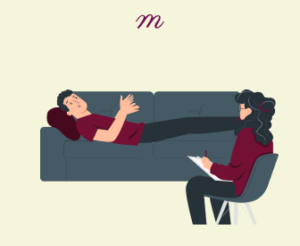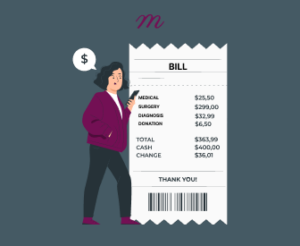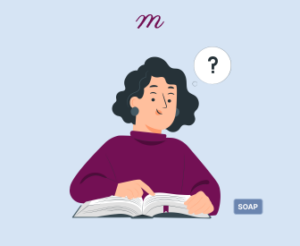Physical limitations can cause a variety of challenges with note-taking for mental health professionals. For many, note-taking is overwhelming and stressful enough, and when you add physical limitations, it makes it even more challenging to complete paperwork-related tasks.
Vision-impaired individuals and those with carpal tunnel may deal with pain or eye strain, making documentation difficult. Many mental health clinicians do their work on a computer today, and looking at a computer screen for extended periods may increase pain as it puts a strain on your eyes and wrist to type for long periods.
If this sounds like you, there are some tools you can use to help improve your documentation. Assistive devices and AI tools can make documentation less stressful and time-consuming.
Finding new tools that work for you feel like you’ve opened a present on Christmas morning, or at least that’s what one of our user Matthew, said about discovering Mentalyc’s AI software. Learning from the experience of other users’ questions and concerns can help you decide what’s best for you when finding and using new tools.

New! Transfer your notes to EHR with a single click. No more copy-pasting.
What is carpal tunnel?
Carpal tunnel is a condition that often causes numbness and tingling in the hand. For some individuals, carpal tunnel can be very painful to deal with. The syndrome is caused by pressure on the median nerve.
Carpal tunnel has various causes; some potential causes of carpal tunnel include:
- Repetitive movements with your hands
- Hormonal changes
- Blood sugar changes
- Family history of carpal tunnel
- Bone or joint disease
- Strains, sprains, and injuries to the wrist
Many people with carpal tunnel experience grip weakness. You may also experience tingling, numbness, or weakness in your fingers.
Carpal tunnel can be treated in many ways, such as:
- Hand splints
- Medication
- Surgery
- Lifestyle changes to your workspace
- Exercise
Consult with a medical professional to determine the best course of treatment for you.
What is vision impairment?
Vision impairments are conditions that deviate from typical vision. People with vision impairment may experience a spectrum ranging from mild vision loss to total blindness. Vision impairments cannot be corrected with glasses.
Some common symptoms associated with vision loss include:
- Pain in your eye
- Blurry vision
- Floaters and flashers
- Light sensitivity
- The appearance of black spots in your vision
- Rapid loss of vision
The severity of vision loss determines the available treatment options. If you are experiencing rapid vision loss, or have a vision impairment, consider speaking with a medical professional to know what treatment options are available.
What tools are available to me?
There are a multitude of tools you can use if you’re experiencing vision impairment or Carpal Tunnel. Assistive devices, dictation tools, and AI tools can all be powerful products that can change how you practice therapy.
Assistive devices
If you’re looking for some physical tools that might help deal with carpal tunnel and make the note-taking process more pleasant, here are some items you may consider:
- Wrist brace
- Ergonomic mouse
- Wrist cushion
- Ergonomic pen
- Mouse cushion
These products can help you adjust posture and position, making you more comfortable and alleviating pain.
If you’re vision impaired, you may also benefit from assistive devices that help improve the quality of your notes.
Some potential products that might be useful include:
- Text-to-speech readers
- Braille assistants for your smartphone
- Braille embossers
These products may assist you with reading or creating notes or text.
Dictation tools
If you have carpal tunnel syndrome, it may be difficult to type for extended periods; additionally, if you have a vision impairment, looking at a screen all day can be tiresome on the eyes. Dictation tools are an excellent way to alleviate eye strain and help decrease the pain from overusing your hand and wrist.
If you’re a mental health professional, dictation tools can be time-savers as we can often speak faster than we can type, and this can help us complete more progress notes quicker.
Some popular dictation tools include:
- Dragon dictation
- Apple dictation
- Winscribe
- Microsoft dictation
- Google docs voice-to-text
Some dictation tools require you to pay to use their services, and other tools mentioned are entirely free.
Mentalyc offers a HIPAA Compliant dictation option, and here’s what one of our users, Matthew had to say about it:
“If your client didn’t want to be recorded, you could use the dictation option,” Matthew said that dictation can help busy professionals by creating specific note formats such as SOAP or DAP notes. He notes that some clients may be hesitant to be recorded, but it all depends on how you approach the topic with clients, and dictation may be a good option if they object.
AI Tools
One of the most transformative tools you can use is AI tools to help you write your notes and stay updated on documentation.
Mentalyc is an AI tool that helps you write your progress notes in under 2-minutes. You upload a recording of your therapy session, and Mentalyc writes your notes for you.
Matthew Meyers, a psychotherapist with 21 years of experience and one of Mentalyc’s users, discussed his experience using Mentalyc as someone who has experienced physical limitations and vision impairment.
In an in-depth interview, Matthew discussed how Mentalyc has been a lifesaver for him since he was born with cerebral palsy that affects the left side of his body. Matthew is blind in his right eye, and his left hand isn’t usable. He has carpal tunnel from overuse of his right hand.
He reports that he has struggled with the documentation for a while and, having additional physical limitations, has felt like he is working with “half a battery.”
He talks about how documenting sessions, focusing on his clients, and taking notes with one working hand are very challenging. Like many mental health professionals, he gets overwhelmed trying to keep up with documentation, and his disabilities add to the challenge.
In our interview, he talked about trying to find other tools that did what Mentalyc does; he said:
“I tried multiple platforms to take notes through EHRs, and other applicable programs. It wasn’t working out for me; it was still creating barriers.”
He states that when he found Mentalyc, he didn’t know something like it existed; he says:
“I was looking for something to relieve this difficult task for me; I was in awe. The first time I saw it, it was like Christmastime; it was what I was looking for.”
He speaks about Mentalyc’s improvements over time as one of the software’s best features. He states he has grown with Mentalyc and says Mentalyc is excellent at taking user feedback, responding, and making improvements.
Matthew states that the best features of Mentalyc are the accuracy of the software, the continued improvements, and the multiple options for note formats. He also mentions how quickly Mentalyc generates a note after uploading a session.
If you’re a mental health professional with any disability, this shows that your limitations don’t have to hold you back. Having the right tools can make a huge difference. Matthew sees more clients since using Mentalyc than he did before finding the software.
His advice for using this software is as follows:
“I think it’s a game-changer in the industry, note-taking, paperwork; it’s stressful for providers, it’s something to help compliance and is good for capturing the session. My advice is to lean into it just as I did, and experience it and test it out.”
If you want to give Mentalyc a shot, don’t wait, you can sign up for a free trial here.
Mentalyc is not the only AI tool; it is HIPPA-compliant and created specifically for mental health clinicians.
The Bottom Line
If you have an impairment that makes it difficult to do your job’s daily tasks, like writing progress notes or completing intake paperwork, you might be stressed out. Documentation for mental health professionals can be tedious. If you want to stress less about this, you can use dictation services to assist with documentation or AI tools such as Mentalyc to write progress notes.
The benefits AI tools can have for those with disabilities are numerous. For Matthew, it has allowed him the freedom to increase his caseload and see more people because he stresses less about getting his notes done and can do them faster than before.
Additionally, you can buy products for both carpal tunnel and vision impairment that can lessen pain and stress. If you need help with mental health documentation and have either of these conditions, your life can change by trying a new tool.
AI tools and other assistive devices can help alleviate pain, make writing progress notes easier and faster, and allow more time to focus on what matters in your therapy sessions.
Sources:
- Cleveland Clinic. (2022). Blindness and low vision. https://my.clevelandclinic.org/health/diseases/24446-blindness
- John Hopkins University. (n.d.). Carpal Tunnel Syndrome. https://www.hopkinsmedicine.org/health/conditions-and-diseases/carpal-tunnel-syndrome
Disclaimer
All examples of mental health documentation are fictional and for informational purposes only.
Why other mental health professionals love Mentalyc

“It’s so quick and easy to do notes now … I used to stay late two hours to finish my notes. Now it’s a breeze.”
Licensed Professional Counselor

“A lot of my clients love the functionality where I can send them a summary of what we addressed during the session, and they find it very helpful and enlightening.”
Therapist

“Having Mentalyc take away some of the work from me has allowed me to be more present when I’m in session with clients … it took a lot of pressure off.”
LPC

“It takes me less than 5 minutes to complete notes … it’s a huge time saver, a huge stress reliever.”
Licensed Marriage and Family Therapist






